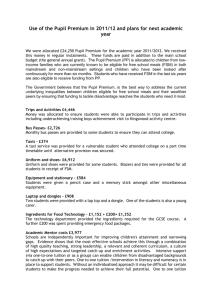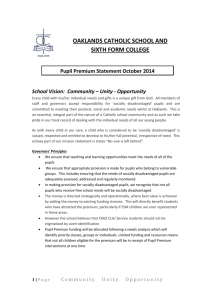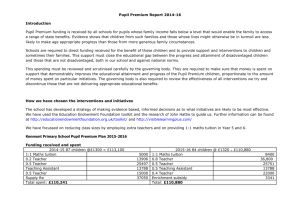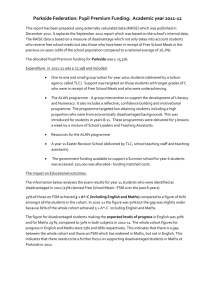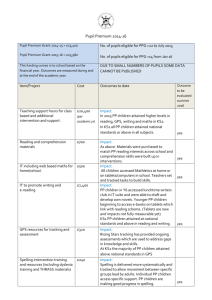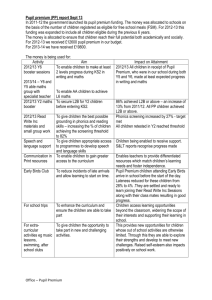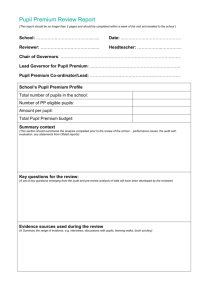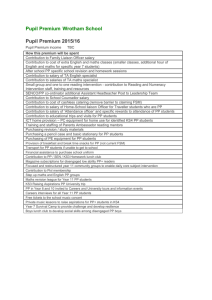Pupil Premium Statement - Oaklands Catholic School & Sixth Form
advertisement
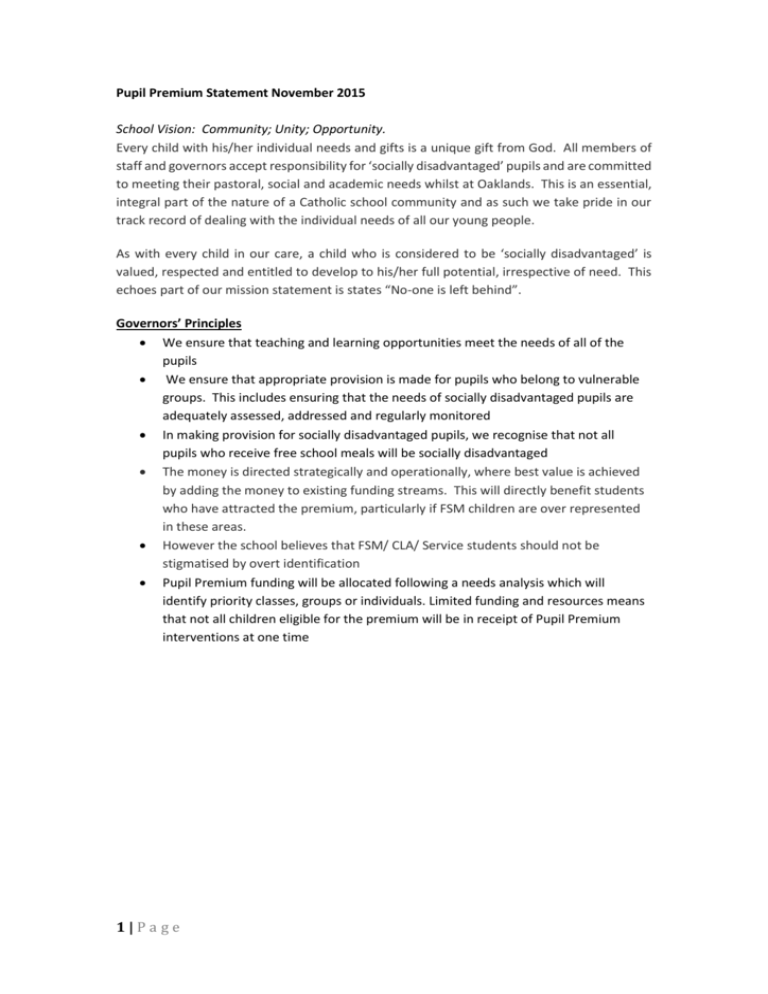
Pupil Premium Statement November 2015 School Vision: Community; Unity; Opportunity. Every child with his/her individual needs and gifts is a unique gift from God. All members of staff and governors accept responsibility for ‘socially disadvantaged’ pupils and are committed to meeting their pastoral, social and academic needs whilst at Oaklands. This is an essential, integral part of the nature of a Catholic school community and as such we take pride in our track record of dealing with the individual needs of all our young people. As with every child in our care, a child who is considered to be ‘socially disadvantaged’ is valued, respected and entitled to develop to his/her full potential, irrespective of need. This echoes part of our mission statement is states “No-one is left behind”. Governors’ Principles We ensure that teaching and learning opportunities meet the needs of all of the pupils We ensure that appropriate provision is made for pupils who belong to vulnerable groups. This includes ensuring that the needs of socially disadvantaged pupils are adequately assessed, addressed and regularly monitored In making provision for socially disadvantaged pupils, we recognise that not all pupils who receive free school meals will be socially disadvantaged The money is directed strategically and operationally, where best value is achieved by adding the money to existing funding streams. This will directly benefit students who have attracted the premium, particularly if FSM children are over represented in these areas. However the school believes that FSM/ CLA/ Service students should not be stigmatised by overt identification Pupil Premium funding will be allocated following a needs analysis which will identify priority classes, groups or individuals. Limited funding and resources means that not all children eligible for the premium will be in receipt of Pupil Premium interventions at one time 1|Page The following table shows the amount and breakdown of the funding received by Oaklands Catholic School for students attracting the Pupil Premium. 2013-14 Total NOR Yr 7 - 11 Percentage of FSM pupils Number of FSM pupils eligible for Pupil Premium 2014-15 2015-16 1123 1117 1121 18.28% 17.3% 18.44% Pro-rata Sep 13 – Mar 14 119 @ £900 = £62,475 122 @ £935 = £114,070 135 @£935 = £126, 225 3 @ £1,900 = £5,700 4 @ £1900 = £7, 600 82 @ £300 = £24,600 73 @ £300 = £21,300 205 = £131,700 198 = £ 141,070 69 @ £300 = £24, 500 206 = £150, 725 Pro-rata Apr 14 – Aug 14 119 @ £900 = £44,625 Number of looked after children eligible for pupil premium Pro-rata Sep 13 – Mar 14 4 @ £900 = £1,200 Pro-rata Apr 14 – Aug 14 4 @ £1,900 = £2,400 Number of service children eligible for pupil premium Total Oaklands Catholic School is individually tracking interventions and financial assistance for any student who attracts the Pupil Premium funding for free school meals, Services children, Looked After Children and Year 7 Catch Up. Interventions for students attracting this stream of funding are variable and might typically include any of the following: HLTA intervention in English to support improved progress HLTA intervention in Maths to support improved progress HLTA intervention in Science to support improved progress Training of another ELSA HTLA to ensure that emotional support is available for all PP students as and when required Focused academic mentoring by a team of staff External mentoring for disengaged PP students (KS4) Sports training with PFC LSA support in Humanities to support improved progress 2|Page Year 7 Intervention in English and Maths to ensure that students progress from a Level 3 (or lower) to a Level 4 following entry to Oaklands KS4 Transition mentoring to ensure that students receive appropriate support to access the KS4 GCSE and Level 2 curriculum Year 11 focused intervention in small classes to ensure successful outcomes in English and Maths Support for extra curricular activities, trips, equipment or uniform Revision resources for GCSE and KS3 (where appropriate) Curriculum enhancement resources (subject specific publications in History, RE) Literacy and Numeracy Intervention groups in our Learning Support Department (KS3) Supply of essential curricular resources for Art and Technology Contribution to peripatetic music lessons to raise aspirations Extra staffing in Maths and English to work with specific groups of underachieving PP students Data tracking software to analyse progress (SISRA) Family Support Worker to support attendance, engagement with school and mediate parent-child relationship breakdown PEP support for Looked After Children and subsequent identified materials/resources Universal support for literacy through our Flying Start and Book Buzz initiative Pupil Premium used for catch up funding English Intervention Math Intervention One to one support Science intervention Family Support Worker Design materials/resources Support for Trips and visits and assisted travel Educational supplies including revision aids Tuition (Music/Maths) Alternative curriculum support Emotional/pastoral support Tracking software Meals IT- curriculum access Uniform Flying start/Book Buzz Total 3|Page Amount allocated to intervention/action during 14/15 (£) £13, 731 £13, 731 £48, 034 £11, 443 £16, 528 £1, 563 £4, 135 £423 £267 £23, 392 £8, 185 £199 £19, 594 £361 £293 £85 £162, 493 Tracking of Progress: The school collects and analyses detailed data on core subjects (English, Maths and Science) for all PP students Yr7 -11 and ensures that this analysis is scrutinized by subject departments. This data is then followed up in Line Management to ensure that progress is discussed and evaluated prior to the next data collection. In examination reviews, PP progress is reported on as a separate tracking group. Staff identify all PP students on registers and seating plans and work from the Sutton Trust “Gap busters” strategies. Progress of PP students is also included in ALL teaching staff’s Performance Management Targets. Impact: We are accelerating the progress of disadvantaged students in both Key Stages (3 levels of progress in English and Maths in 2015) In Maths we have dramatically narrowed the gap between disadvantaged and non disadvantaged students with 3 levels of progress to only 8% (previously 22%) Pupil Premium Group 2015 23 students (FSM/FSM6) 5x A*-C (En&Ma) 5x A*-C English (3 levels Maths (3 levels) Non-PP Gap 5x A*-C (En&Ma) 5x A*-C English (3 levels) Maths (3 levels) 52% 52% 65% 57% 72% 80% 81% 76% 20% 28% 16% 19% FSM comparisons 5x A* - C (E&M) 2013 2014 2015 4|Page FSM 50% 36% 52% Non FSM 75% 67% 72% 3 Levels progress English FSM Non FSM 62% 83% 40% 83% 65% 81% 3 levels progress Maths FSM Non FSM 52% 74% 60% 68% 57% 76%
